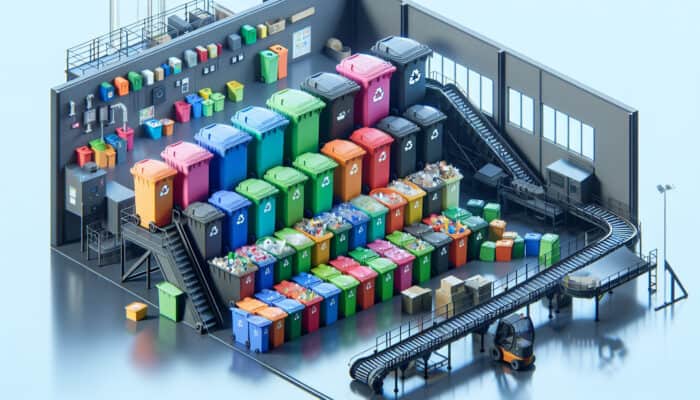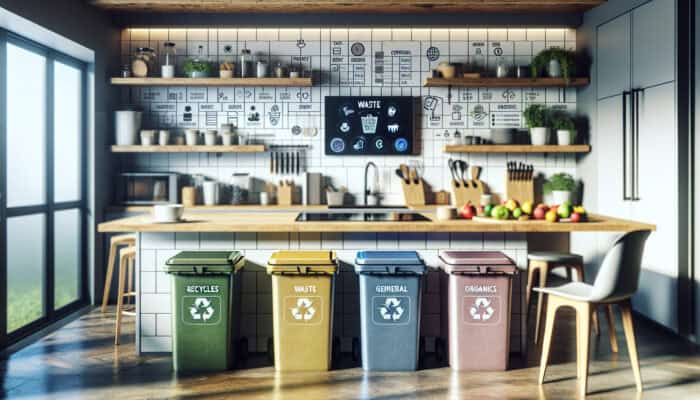Introduction to Advanced Waste Sorting in the UK
What is Advanced Waste Sorting?

Advanced Waste Sorting for House Clearance: Advanced waste sorting is an essential process that involves categorising waste into various types to facilitate efficient disposal or recycling, designed specifically to adhere to UK standards and regulations. This method promotes effective waste management, helping to conserve resources and protect the environment. Many households in the UK engage in advanced waste sorting to streamline their waste disposal processes and support local recycling initiatives. A few common waste categories in the UK include:
- General waste
- Recyclables (plastic, metal, paper, and glass)
- Organic waste (food and garden waste)
- Hazardous waste (batteries, chemicals)
- Electrical waste (e-waste)
- Bulky items (furniture, appliances)
- Construction waste (building materials)
Understanding these categories is crucial for households to manage their waste effectively and contribute to environmental sustainability.
Benefits of Implementing Advanced Waste Sorting
Implementing advanced waste sorting brings significant benefits, reducing the amount of waste sent to landfills and promoting increased recycling rates. In the context of the UK’s environmental strategy, this practice is vital for conserving resources and mitigating the adverse effects of waste on the ecosystem. The key environmental benefits of advanced waste sorting include:
- Reduction in landfill usage
- Increased recycling rates
- Conservation of natural resources
- Decreased greenhouse gas emissions
- Enhanced soil and water protection
- Promotion of a circular economy
- Improved community awareness and education regarding waste management
By adopting advanced waste sorting practices, UK households can play a crucial role in promoting a sustainable future and mitigating the environmental impact of waste.
UK Regulations and Compliance
The UK has established stringent laws and regulations governing waste management to ensure environmental safety and compliance with regulations. These regulations mandate specific waste sorting and disposal methods that households must follow to minimise their environmental footprint. Current UK waste management regulations include:
- Waste Management Licensing Regulations
- Environmental Protection Act 1990
- Waste Electrical and Electronic Equipment (WEEE) Regulations
- Controlled Waste Regulations
- Household Waste Recycling Act 2003
- Packaging Waste Regulations
- Landfill Tax Regulations
Understanding and adhering to these regulations is crucial for UK residents to ensure responsible waste management and contribute to the government’s overall sustainability goals.
How Does Advanced Waste Sorting Work in UK Homes?

Sorting Techniques for UK Households
In UK homes, effective sorting techniques are paramount for successful advanced waste sorting. Households typically implement strategies that involve segregating recyclables from non-recyclables and using colour-coded bins aligned with local council guidelines. For instance, many councils use a three-bin system: one for general waste, one for recyclables, and one for organic waste. Some of the most effective sorting techniques for UK households include:
- Separating waste into designated bins
- Utilising colour-coded bin systems for clarity
- Labelling bins to prevent contamination
- Regularly emptying bins to avoid overflow
- Educating all household members on sorting practices
- Using clear bags for recyclables to enhance visibility
- Creating a waste sorting station in a convenient location
By implementing these sorting techniques, UK households can ensure they are making effective contributions to waste management and supporting local recycling efforts.
What Are the Best Practices for UK Waste Sorting?
Best practices for waste sorting in the UK are crucial for achieving optimal results and improving recycling rates. Adopting a systematic approach can greatly enhance the efficiency of waste management efforts in households. Key best practices include maintaining a consistent sorting schedule, using designated bins for different types of waste, and adhering to UK waste management protocols. Here are some actionable strategies for UK households to improve their waste sorting practices:
- Establishing a routine for waste collection and sorting
- Encouraging family members to take part in sorting activities
- Keeping waste bins in accessible locations
- Utilising educational resources to inform household members
- Participating in local community recycling programmes
- Reviewing local council guidelines for updates on waste sorting
- Using composting for organic waste to reduce landfill contributions
By embracing these best practices, UK households can enhance their waste sorting efforts and contribute to a more sustainable environment.
Tools and Equipment for UK Waste Sorting

To facilitate effective waste sorting in UK homes, several tools and equipment can be utilised. These resources not only aid in the sorting process but also promote better waste management practices within the household. Essential tools for effective waste sorting in UK homes include:
- Colour-coded bins for recyclables, general waste, and organics
- Compost bins for organic waste disposal
- Recycling bags for easy transport of materials
- Shredders for paper and cardboard waste
- Labels for identifying different waste categories
- Smart bins that notify when full or require disposal
- Waste sorting apps that provide real-time guidelines and tips
Incorporating these tools and equipment into daily routines can significantly enhance the efficiency of waste sorting practices and support local recycling initiatives.
Expert Insights on Advanced Waste Sorting for House Clearance
Include Real-World Examples of UK Success Stories
Numerous success stories across the UK exemplify how advanced waste sorting has transformed waste management in various communities. For example, in Bristol, the introduction of a comprehensive recycling programme has led to a substantial increase in recycling rates, helping the city achieve its waste reduction targets. In another instance, the London Borough of Camden implemented a borough-wide waste engagement campaign that educated residents on the importance of effective waste sorting, resulting in a 30% increase in participation rates in recycling initiatives. These real-world examples highlight the tangible benefits and positive outcomes of advanced waste sorting in UK communities.
Provide Actionable Steps for UK Residents
For UK residents looking to implement advanced waste sorting at home, taking actionable steps is key. It begins with setting up a dedicated sorting station that is easily accessible to all household members. Residents can begin by designating specific bins for recyclables, non-recyclables, and organic waste, ensuring that everyone understands the purpose of each bin. Another important step is to educate family members on the significance of waste sorting and how their actions can contribute to environmental sustainability. Additionally, engaging in local community events or workshops focused on waste management can further enhance understanding and commitment to advanced waste sorting practices.
Offer Expert Analysis on UK Waste Sorting Trends
As environmental awareness continues to rise in the UK, experts predict an increase in the adoption of advanced waste sorting in households. One notable trend is the growing emphasis on digital solutions, such as apps that help residents adhere to sorting guidelines and waste collection deadlines. Furthermore, local councils are increasingly collaborating with communities to provide education on waste sorting, reinforcing the importance of resident participation. Experts also highlight the trend towards reducing single-use plastics as a direct result of heightened awareness regarding sustainability. As these trends evolve, UK residents are likely to witness a more organised and strategic approach to waste management.
Highlight the Role of Technology in UK Waste Sorting
Technology is rapidly transforming the waste sorting landscape in the UK, enhancing efficiency and effectiveness in households. Smart bins equipped with sensors can monitor waste levels and notify users when they need to be emptied, reducing overflow and promoting timely disposal. Additionally, waste sorting apps offer real-time guidelines and tips tailored to local council regulations, making it easier for residents to comply with sorting requirements. The integration of technology into waste management not only streamlines the sorting process but also fosters an increase in community engagement and participation in recycling efforts.
Discuss the Impact of Legislation on UK Waste Sorting Practices
Recent legislation in the UK is driving significant changes in waste sorting practices, encouraging households to adopt more sustainable waste management methods. For instance, the introduction of the Resources and Waste Strategy aims to promote a circular economy, which influences how residents perceive and manage waste. Moreover, new regulations aimed at reducing single-use plastics and increasing recycling rates are prompting local councils to enhance their recycling services and provide more effective guidance to households. The influence of legislation is evident in the growing awareness and commitment among UK residents to adopt advanced waste sorting practices as part of their daily lives.
What Are the Environmental Impacts of Advanced Waste Sorting in the UK?
Reduction in Landfill Use
Advanced waste sorting plays a crucial role in significantly reducing the amount of waste sent to landfills in the UK. By effectively categorising waste into appropriate streams, households can ensure that recyclables are processed correctly, leading to a decrease in the volume of waste that requires disposal. This reduction not only conserves valuable land resources but also diminishes the environmental impact associated with landfill sites, such as soil and water contamination. Through advanced waste sorting, UK residents can contribute to a cleaner and healthier environment by minimising landfill usage and supporting sustainable waste management practices.
Increase in Recycling Rates
One of the most significant impacts of advanced waste sorting is the notable increase in recycling rates across the UK. By promoting effective sorting practices, households can ensure that recyclable materials are not contaminated with non-recyclables, leading to a higher percentage of materials being processed and reused. This increase in recycling rates contributes to resource conservation, as recycled materials can be reintroduced into the manufacturing process, reducing the demand for virgin resources. The emphasis on advanced waste sorting has encouraged households to actively participate in recycling initiatives actively, thereby enhancing overall community engagement in waste management.
Contribution to the UK’s Sustainability Goals
Advanced waste sorting is intrinsically linked to the UK’s sustainability goals, promoting a circular economy that reduces environmental impact and conserves resources. By implementing effective waste sorting practices, households contribute to reducing waste generation and promoting recycling, aligning with government objectives to achieve net-zero carbon emissions by 2050. The practice not only supports the conservation of natural resources but also enhances community awareness regarding responsible waste management, fostering a culture of sustainability. Through advanced waste sorting, UK residents can actively participate in a broader movement towards environmental stewardship and sustainability.
What Challenges Do UK Residents Face with Advanced Waste Sorting?
Lack of Awareness and Education
A significant challenge faced by many UK residents regarding advanced waste sorting is the lack of awareness and education about its benefits and the methods involved. Many individuals are unsure of how to sort their waste properly, leading to contamination and ineffective recycling processes. To improve waste sorting awareness in the UK, educational initiatives can be implemented, such as community workshops, informational campaigns, and engaging school programs. By providing residents with the necessary knowledge and resources to understand the importance of waste sorting, communities can foster a culture of responsibility and environmental stewardship.
Limited Space for Sorting
Space constraints in UK homes can present challenges when implementing effective waste sorting systems. Many households, particularly those in urban areas, struggle to find suitable locations for multiple bins or composting systems. To overcome these space limitations, UK residents can explore compact solutions such as stackable bins or integrated waste sorting systems that combine multiple functions. Additionally, utilising vertical space, such as shelves or wall-mounted bins, can optimise available areas for waste sorting. By innovating within their available space, residents can create efficient systems that support advanced waste sorting practices.
Inconsistent Local Council Guidelines
Inconsistencies in waste sorting guidelines across different UK councils can confuse residents and hinder proper waste management practices. With various rules and regulations regarding what can be recycled and how waste should be sorted, many individuals may find it challenging to comply with local protocols. To standardise waste sorting guidelines, UK councils can collaborate and establish clearer communication strategies for residents. Providing accessible resources, such as online materials or community workshops, can help ensure that residents are informed about proper waste sorting practices and encourage adherence to local guidelines.
Research-Backed Benefits of Advanced Waste Sorting for House Clearance
Economic Benefits for UK Households
Research indicates that advanced waste sorting can lead to significant economic benefits for UK households, primarily through reduced waste disposal fees. By sorting waste effectively and recycling more materials, households can lower their overall waste volume, which can result in lower charges for waste collection services. Additionally, many local councils incentivise recycling initiatives, further enhancing the financial benefits for residents. Embracing advanced waste sorting not only contributes to environmental sustainability but also offers tangible cost savings for households.
Health and Safety Improvements
Implementing advanced waste sorting practices can substantially improve health and safety in UK homes. By properly segregating hazardous waste, such as batteries and chemicals, residents can minimise the risk of exposure to harmful substances. Furthermore, reducing clutter through effective waste management can lead to safer living environments, decreasing the chances of accidents related to hazardous materials. Advanced waste sorting fosters a cleaner and healthier home, supporting the well-being of all household members.
Long-Term Environmental Impact
Studies demonstrate that advanced waste sorting has a significant long-term positive impact on the UK environment. By reducing landfill reliance and increasing recycling rates, advanced waste sorting contributes to a decrease in pollution and resource depletion over time. This sustainable practice supports the preservation of natural ecosystems, promoting biodiversity and environmental resilience. Emphasising advanced waste sorting not only benefits current generations but also lays a foundation for a healthier planet for future generations.
Enhanced Recycling Efficiency
Advanced waste sorting enhances recycling rates by ensuring that materials are correctly separated and processed, resulting in more efficient recycling processes in the UK. When recyclable materials are uncontaminated, they can be processed more efficiently, which results in higher recovery rates and better-quality recycled products. This efficiency enhances the overall effectiveness of recycling programs, supporting the continual circular economy. By prioritising advanced waste sorting, residents contribute to a more streamlined recycling process that benefits the environment.
Community and Social Benefits
The implementation of advanced waste sorting can foster community engagement and education on waste management, promoting social responsibility in the UK. Community-led initiatives, such as local recycling events or educational workshops, encourage residents to participate actively in waste sorting efforts. These initiatives not only raise awareness but also create a sense of camaraderie among residents, encouraging collaboration towards shared sustainability goals. The social benefits of advanced waste sorting contribute to building stronger, more resilient communities committed to responsible environmental practices.
Trusted Strategies for Advanced Waste Sorting for House Clearance
Community-Based Waste Sorting Initiatives
Community-based initiatives play a vital role in encouraging residents to participate in collective waste sorting efforts. Local councils can organise community clean-up days, recycling drives, or educational workshops that bring residents together to learn about best practices for waste management. Such initiatives promote awareness and foster a sense of responsibility towards the environment. By engaging in community-based waste sorting initiatives, UK residents can share valuable knowledge, resources, and experiences, ultimately leading to improved waste management practices across the community.
Incorporating Technology in Waste Sorting
The integration of technology in waste sorting can significantly streamline processes for UK households, enhancing both efficiency and engagement. Smart bins, for example, can monitor waste levels and notify users when they require emptying, thereby minimising overflow and ensuring timely disposal. Additionally, waste sorting apps can provide tailored guidance on local recycling guidelines and offer reminders for waste collection days. By incorporating technology into waste sorting practices, UK residents can enhance their waste management efforts and foster a culture of sustainability within their households.
Engaging with Local UK Waste Management Services
Effectively engaging with local waste management services can provide UK residents with valuable resources and guidance on advanced waste sorting. Local councils often offer educational materials, workshops, and community initiatives designed to support residents in their waste management efforts. By actively seeking out information and participating in local programmes, households can stay informed about the latest recycling initiatives and best practices. This engagement not only supports individual households but also fosters a community-wide commitment to responsible waste management.
FAQs
What is advanced waste sorting?
Advanced waste sorting is the practice of categorising waste into different types for efficient disposal or recycling, adhering to UK standards and regulations.
What are the benefits of advanced waste sorting?
The benefits include reduced landfill use, increased recycling rates, conservation of natural resources, and decreased greenhouse gas emissions.
What are the key waste categories in the UK?
Common waste categories include general waste, recyclables, organic waste, hazardous waste, electrical waste, bulky items, and construction waste.
How can UK households improve their waste sorting practices?
Households can improve practices by establishing regular sorting schedules, using designated bins, and educating family members on waste management.
What tools are essential for effective waste sorting in UK homes?
Essential tools include colour-coded bins, compost bins, recycling bags, shredders, and waste sorting apps.
How does advanced waste sorting reduce landfill use?
By effectively categorising waste, households can ensure that recyclable materials are processed correctly, leading to reduced landfill contributions.
What impact has advanced waste sorting had on UK recycling rates?
Advanced waste sorting has led to a notable increase in recycling rates, contributing to resource conservation and minimising environmental impact.
What challenges do UK residents face with waste sorting?
Challenges include a lack of awareness, limited space for sorting systems, and inconsistent guidelines from local councils.
What are the long-term environmental impacts of advanced waste sorting?
Long-term impacts include reduced pollution, resource conservation, and enhanced ecosystem health, promoting sustainability for future generations.
How can technology improve waste sorting in UK households?
Technology can improve waste sorting through smart bins that monitor waste levels and waste sorting apps that provide real-time guidance on local regulations.





